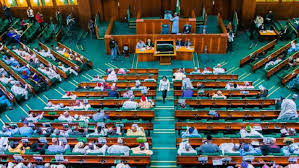
The House of Representatives has attacked organised labour, comprising the Nigeria Labour Congress and Trade Union Congress, for feeding the public about what it described as “fake earnings” of its members.
It said that the attempt was made to stoke public resentment against the lawmakers and undermine the credibility of the legislature.
It warned that such acts could stoke public resentment against lawmakers and undermine the legislature’s credibility, calling for the actors sabotaging the nation’s economy to be brought to justice.
The House made this known in a statement signed by its spokesperson, Akin Rotimi, on Tuesday.
The statement read, “The House of Representatives acknowledges the recent industrial action undertaken by the NLC and the TUC due to the breakdown in negotiations for a new national minimum wage.
“The People’s House is pleased to note that the strike action has been suspended for one week to allow for further negotiation.
“During this period, as we have previously demonstrated, the People’s House remains responsive and committed to actively engaging all stakeholders to resolve the issues in the best interest of Nigerians.
“House Speaker Abbas Tajudeen has consistently advocated a living wage and better working conditions for workers.
“At various fora, he has emphasised the importance of addressing key national priorities, including the state of the economy and insecurity, through legislative action.
“While the Green Chamber is in full support of the call for improved wages and working conditions, there is a great need to exercise caution in increasing the minimum wage beyond what our economy can sustain to avoid unintended outcomes such as inflation, layoffs, and other adverse economic consequences.
“Thus, we restate the importance of approaching this issue from a balanced perspective to ensure long-term stability and prosperity for all.
“In the same vein, we observed with concern the direction of the strike action before its suspension and what it portends for the future.”
The House also condemned the shutdown of critical infrastructure, such as the national grid and airports, during the joint unions’ mandated strike.
“Importantly, the shutdown of critical infrastructure, such as the national grid, constitutes economic sabotage and is detrimental to the well-being of our country. Those responsible for these actions must be held accountable.
“We also find it troubling that the leadership of Organised Labour, the majority of who live far above the means of the average Nigerian, would engage in actions that exacerbate the suffering of ordinary citizens.
“It is necessary, therefore, to state that while industrial actions and dissent are fundamental rights within our democratic space that must be protected, the manner in which Labour conducted itself during the just-suspended strike largely shows a lack of empathy for Nigerians.
“Is the objective of the leadership of the unions to compel the government to implement a living wage or to inflict pain on Nigerians?
“Additionally, it is important to address persistent misinformation and disinformation propagated by organised Labour leadership regarding the earnings of lawmakers.
“This is especially because organised Labour has, for years, contributed to false narratives about the remuneration of members of the National Assembly, exaggerating figures to stoke public resentment and undermine the credibility of the Legislature.
“This tactic diverts attention from the core issues at stake and unfairly vilifies the institution of parliament. It is crucial for all parties to engage in an honest and transparent dialogue rather than resorting to the spread of inaccuracies for political leverage.
“Contrary to the insinuations of the Labour leadership through its social media platforms, the Legislature is on the side of Nigerians and will continue to act in the best interest of our constituents – giving meaning to their mandate.
It further urged the union leadership to return to the negotiation table and engage other stakeholders in good faith to achieve a balanced and sustainable outcome.
Comments